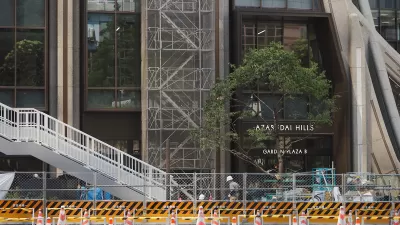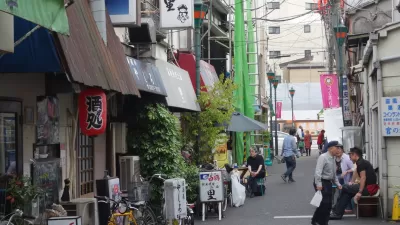ASLA's blog, The Dirt, dishes on how sushi, an ancient food, became modern in Tokyo, and conquered the world.
What we, in the West, consider sushi was invented in Tokyo in the beginning of the 19th century. The Dirt provides the story, as told by professor Jordan Sand, Georgetown University, at the recent Food & The City symposium at Dumbarton Oaks in Washington, D.C.:
"With the need for "fast food," usually eaten on the run by Samurai and
their short-term mates out on the town, new variations of sushi came
into being. To fit the need, "restauranteurs first made street food
fancy and then they made it fast," said Sand. By the 1820s, these early
innovators stopped the pickling process and Nigirizushi (or sushi as we
know it in the West) became a "hit" among the Samurai and
commoners alike. What made sushi interesting, and perhaps transgressive,
was that it combined elite foods of the Samurai and street foods of the
common classes, creating a new form."
The story doesn't end there. Read on for more about the food's impact on the built and natural environments.
FULL STORY: How Tokyo Invented Sushi

Planetizen Federal Action Tracker
A weekly monitor of how Trump’s orders and actions are impacting planners and planning in America.

Chicago’s Ghost Rails
Just beneath the surface of the modern city lie the remnants of its expansive early 20th-century streetcar system.

San Antonio and Austin are Fusing Into one Massive Megaregion
The region spanning the two central Texas cities is growing fast, posing challenges for local infrastructure and water supplies.

Since Zion's Shuttles Went Electric “The Smog is Gone”
Visitors to Zion National Park can enjoy the canyon via the nation’s first fully electric park shuttle system.

Trump Distributing DOT Safety Funds at 1/10 Rate of Biden
Funds for Safe Streets and other transportation safety and equity programs are being held up by administrative reviews and conflicts with the Trump administration’s priorities.

German Cities Subsidize Taxis for Women Amid Wave of Violence
Free or low-cost taxi rides can help women navigate cities more safely, but critics say the programs don't address the root causes of violence against women.
Urban Design for Planners 1: Software Tools
This six-course series explores essential urban design concepts using open source software and equips planners with the tools they need to participate fully in the urban design process.
Planning for Universal Design
Learn the tools for implementing Universal Design in planning regulations.
planning NEXT
Appalachian Highlands Housing Partners
Mpact (founded as Rail~Volution)
City of Camden Redevelopment Agency
City of Astoria
City of Portland
City of Laramie





























